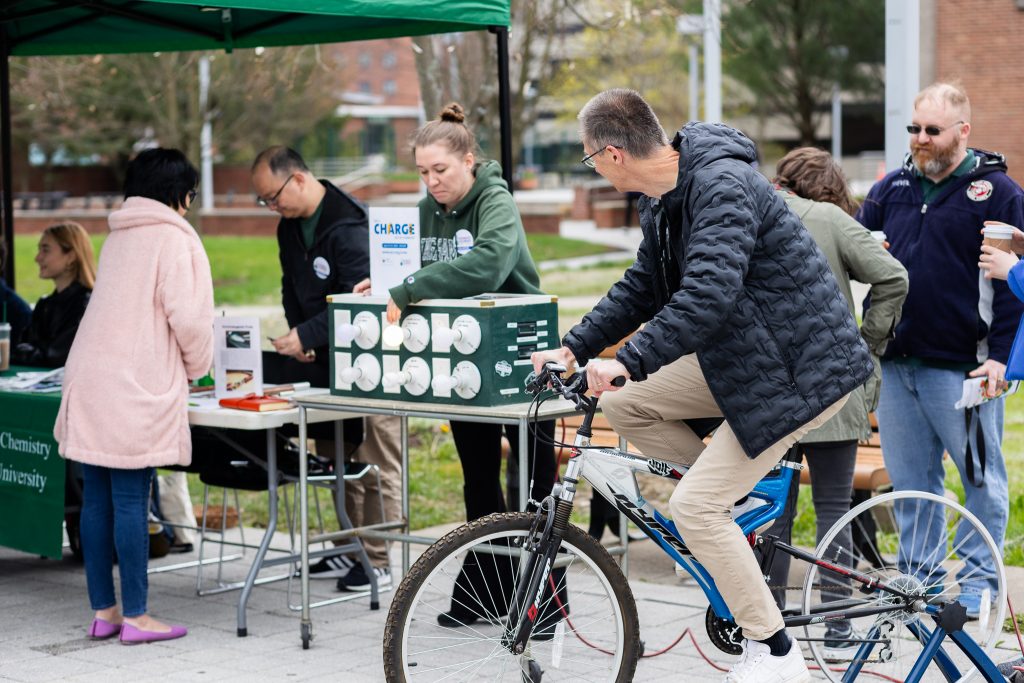Several organizations came together to celebrate at Binghamton University’s annual Earth Day Festival on Friday.
Hosted by the Office of Sustainability, the festival offered the campus community an opportunity to promote sustainability throughout campus and in the community. Clubs and organizations present at the event include Zero Hour Binghamton, the Food Co-Op, the Binghamton Upcycle Project, the Sierra Club, the Ross Park Zoo, the Food Pantry and the Q Center. Each table shared how the organization was reaching out to students about the importance of protecting the environment and finding ways to promote sustainability.
“The annual Earth Day Festival hosted by the Office of Sustainability provides the campus community a glimpse of some of the sustainability-related groups and opportunities available at [BU],” Martin Larocca, the University’s sustainability manager, wrote. “This year’s participating organizations are made up of student groups, academic departments, campus offices, programs and off-campus organizations. Attendees can learn about these organizations, how their work relates to different aspects of sustainability and have the opportunity to get involved with those efforts.”
Earth Day, celebrated on April 22, was first organized in 1970 by Gaylord Nelson, a former governor and senator from Wisconsin, to build public support for the environmental movement. Together with Denis Hayes, a graduate student at Harvard University, Earth Day helped educate participants on environmental degradation and the importance of conservation.
Around 20 million Americans celebrated the first Earth Day across college campuses and local neighborhoods. Nelson believed the creation of Earth Day helped catapult the environmental movement into the mainstream, leading to the passage of environmental legislation throughout the 1970s.
The Earth Day Festival represents the University’s commitment to making its campus more sustainable for its students and staff by utilizing methods to help restore the global ecosystem, foster healthy living and reduce human impact on the environment.
“As an institution of higher learning, we have a commitment to lead by example,” Larocca wrote. “We endeavor to integrate sustainable practices into every facet of our campus community. Actions we take during our daily lives have a carbon emission cost. This ranges from turning on lights, water usage, to purchasing and disposing of materials. Engaging events, like Earth Day, highlight activities the campus community can do to reduce their impact on the environment and help mitigate accelerated climate change.”
The Food Co-Op, a student-run organic grocery store and cafe located in the University Union Undergrounds using compostable and recyclable products, was tabling at the festival. Its members shared the importance of maintaining a sustainable operation by providing a place where students can have the option to eat vegan, locally sourced organic food at an affordable price.
“To me, [Earth Day] means bringing awareness and really just reaching as many people as possible,” said Maggie Saville, the Food Co-Op’s general manager and a senior majoring in environmental science. “Climate change is a huge issue we can’t deal with without really motivating everyone that we can and getting everyone on board to fight this issue.”
Zero Hour Binghamton, an environmental justice organization, works with the University and local organizers in Vestal, Johnson City and Binghamton to address issues relating to climate change. They reached out to attendees, trying to persuade them to sign a petition against the University’s plan to install turf fields in Mountainview and Newing Colleges.
“To me, Earth Day means the beauty of the planet we live on and striving to protect it,” Jacob Weber, the organization’s vice president and a junior double-majoring in philosophy, politics and law and environmental studies, said. “I love being outdoors. I love hiking and backpacking and engaging in the natural beauty around me and a lot of it is disappearing. And I think that Earth Day is an important time to kind of rally people who might not understand that as much as some of the people here tabling for Earth Day do to try and get them to participate in climate action, like rallying against turf fields, that could help to preserve our Earth at the expense of development.”



